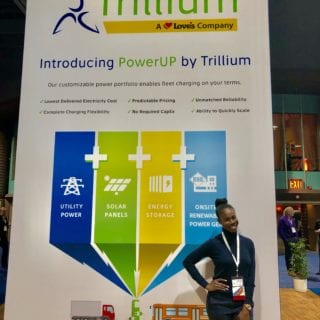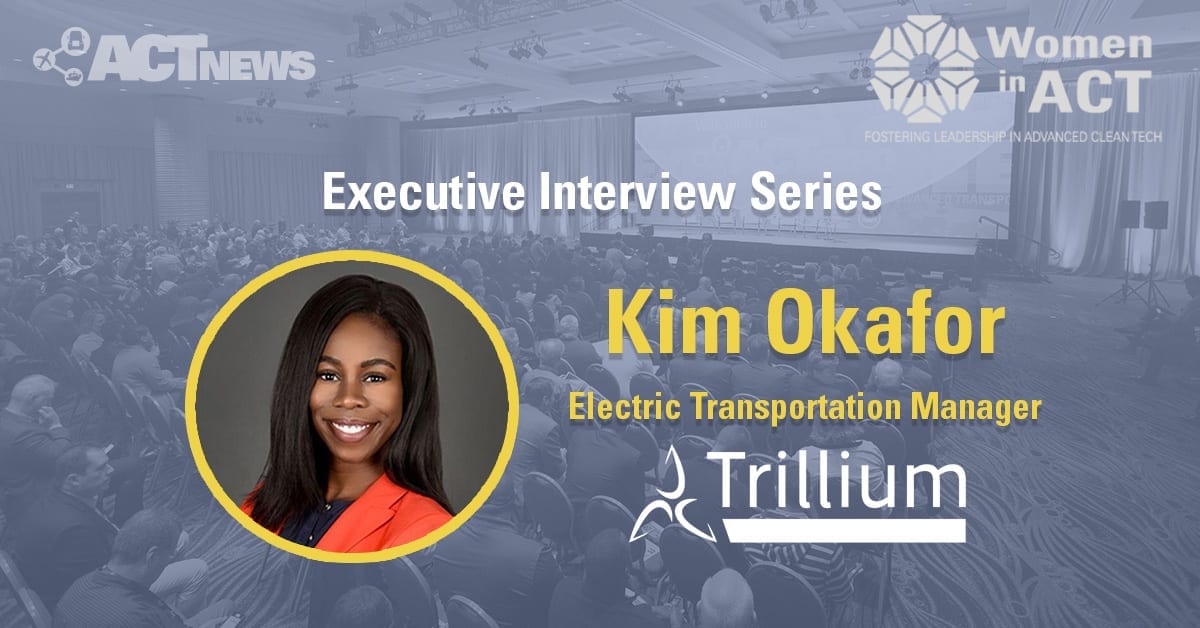An ACT News Executive Interview with Kim Okafor, electric transportation manager, Trillium, a leading provider of alternative fueling solutions and renewable fuels.
Kim Okafor is proud to be on the cutting edge of alternative fuels with the team at Trillium, who introduced the first-of-its-kind integrated EV charging solution in the US at Advanced Clean Transportation (ACT) Expo this past April. PowerUP by Trillium uses a mix of power supply technology ranging from solar panels and on-site generation using renewable natural gas (RNG), to energy storage and power supplied from the local electric utility when necessary. Kim’s goal as Trillium’s electric transportation manager is to be a resource for transit and other fleet customers interested in fleet electrification.
The Women in ACT panel, which also took place at ACT Expo in April, greatly benefited from Kim’s participation, as she wisely reflected on why it’s so critical for women to be involved in the advanced clean tech sector. “Women are natural planners. For the success of alternative fuels, we need to be looking into the future at the end goal. We need to be thinking about all of the milestones along the way, and all the relationships we need to build today, in order to be strategically positioned for the future,” she told the room.
ACT News caught up with Kim to learn more about the innovations that Trillium is advancing as well as her active role in assisting fleets with electrification.
ACT News: Trillium is a leading provider of alternative fueling solutions, specializing in fuel supply, design, installation and operation for innovative energy solutions. What are some of the leading initiatives Trillium is participating in to promote sustainability in transportation?
Kim Okafor: Trillium is a fueling solution provider for fleet customers. We’ve provided compressed natural gas (CNG) solutions for over 25 years. Within the last year and a half, we’ve expanded our offering to include electric vehicle fueling, hydrogen fueling, and power generation, including solar arrays and other microgrid applications. This is in response to the goals and objectives of our customers. Trillium provides the same high-quality design, build, and maintenance capabilities that we’ve perfected over the last two decades, and we are excited to apply them to these new customer opportunities.

Kim Okafor and the Trillium booth at ACT Expo.
ACT News: You lead efforts on behalf of Trillium to bring electric vehicle refueling expertise to fleets, helping them to understand infrastructure costs and power demand costs. What advice does Trillium offer customers in order for them to implement a program for EVs and charging infrastructure?
Kim Okafor: My best advice for operators who have decided to transition to an electric fleet is to plan. Fleets should plan their vehicle transition schedule, calculate and forecast both capital and operational expenses, and conduct research on the different fueling technologies and infrastructure available.
It’s important to begin discussions with your local utility regarding power needs and the associated cost and schedules. This lets the fleet evaluate alternatives for incremental power draw, like generating electricity on-site, in order to add resiliency to fleet refueling. That starts with an understanding of current monthly expenses for power through their utility provider. Starting that conversation today will position the fleet to make informed decisions that optimize a forward-looking solution.
Additionally, Trillium can reduce the amount fleets pay for power through our PowerUP product. PowerUP utilizes on-site power generation fueled by renewable natural gas, a solar array, and/or energy storage in the most optimal configuration to avoid incremental expenses with growing power demand. This combination has the potential to provide low cost power with very little variability in context of the market a fleet operates within. It puts the fleet operator in charge of their power costs, adding price-certainty and reliability well into the future. Trillium can design, build, operate, maintain, and even finance the PowerUP system.
ACT News: You recently spoke on the panel Women in ACT, which took place at ACT Expo in late April, in Long Beach. You spoke of how critical it is for women to be in the advanced clean tech sector, given that women are natural planners. How does this help ensure women are advancing their careers in this sector, and what should women do to be strategically positioned for the future?
Kim Okafor: The fleet transportation fueling industry is in transition. There is unavoidable proof of this in California. Our California transit customers are preparing to transition to zero emission fuels in response to the Innovative Clean Transit (ICT) rule. This will take several years and lots of technical and logistical planning. The way that women can take advantage of this opportunity is by perfecting our planning skills, by continuing to build on our technical abilities, and by confidently presenting our ideas on how to move the industry forward as professionals in the space.
Our California transit customers are preparing to transition to zero emission fuels in response to the Innovative Clean Transit (ICT) rule.
ACT News: Given the rapid advancements taking place in the sustainable transportation space, having an executive leadership team that brings a diverse range of perspectives is critical. What recommendations/advice do you have for women interested in pursuing or advancing their career in the clean transportation and energy sector?
Kim Okafor: My advice for women who are interested in pursuing a career in clean transportation is to learn the industry. Put yourself in a position to learn by getting involved in conversations and decisions. It’s also important to network and build industry relationships. My recommendation for career advancement is to be open to learning something new. As an engineer, several things in my role as electric transportation manager are completely new to me. Instead of shying away from what is new, I make a dedicated effort to learn. You won’t be perfect in the beginning, but as you continue to learn, you will grow professionally.
ACT News: How can state and national transportation policy be streamlined to promote best practices in the transportation industry?
Kim Okafor: Changing the basis of our transportation economy away from fossil fuels to less carbon intensive alternatives requires government intervention to be successful. Policy makers need to put forward a balanced and consistent approach to successfully transform the sector. Success is entirely dependent on private investment, which will only be available if programs aimed at promoting change provide certainty and consistency so investors can have some reasonable means to measure both risks and rewards.
ACT News: What did you learn the hard way?
Kim Okafor: Over the years, I’ve learned the culture and the people in the company you work for have a significant impact on you, your growth, and your career. Our culture at Trillium promotes leadership and innovation. The people at Trillium are all passionate about what they do, and the value that the company brings to the industry. That culture is contagious and pushes me to work that much harder.
ACT News: If you could meet anyone in the world dead or alive who would it be and why?
Kim Okafor: Beyoncé! She’s such a hard-working woman that refuses to be confined to a box. She sees what she wants and goes after it. She’s such an inspiration. I would love to spend a day with her to pick her brain.


